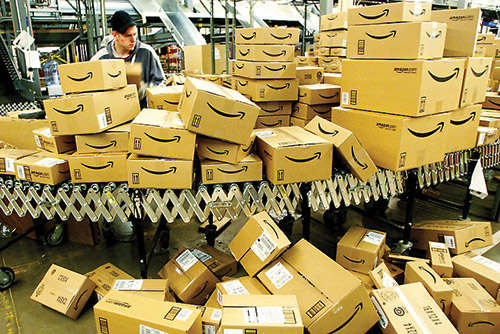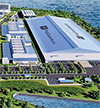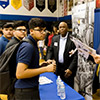Amazon set Thursday, October 19th, as the deadline for proposals. The company didn’t specify a specific date to announce its decision.
When considering locations and real estate options for HQ2, Amazon said it prefers:
- Metropolitan areas with more than one million people
- A stable and business-friendly environment
- Urban or suburban locations with the potential to attract and retain strong technical talent
- Communities that think big and creatively
“We expect HQ2 to be a full equal to our Seattle headquarters,” CEO Jeff Bezos said in a statement. He indicated that cities would need to offer incentives to the company for it to move there. “Incentives offered by the state/province and local communities to offset initial capital outlay and ongoing operational costs will be significant factors in the decision-making process.”
Without commenting specifically on Amazon, Darin Buelow, a Chicago-based principal with Deloitte Consulting LLP, says, “It’s safe to say nobody really knows what any particular priorities are except for the project team within the company. Ultimately, every client we have had set a different weighting for some of the same factors; even companies in the same industry might weight something differently. So it would be really difficult to say ‘x’ is going to be most important to Amazon. Trying to get into their minds to figure out their priorities is pretty difficult; anybody who claims to know doesn’t really know.”
Buelow says it’s difficult to make generalizations about the incentives states may offer. “Each of the lower 48 states is in a different spot in terms of their willingness to be aggressive on incentives. Some really successful economies that are flourishing don’t need to be so aggressive. Others are exactly the opposite; they’re getting more creative and innovative.”
Throwing Their Hats in the Ring
Not all of the HQ2 contenders are emphasizing incentives. The Denver Business Journal reported that, when Colorado submitted its bid, the proposal emphasized the region’s highly educated workforce, quality of life, and global connectivity through its international airport. It didn’t offer any special financial or tax incentives, according to J.J. Ament, president and CEO of the Metro Denver Economic Development Corp.
We expect HQ2 to be a full equal to our Seattle headquarters. Jeff Bezos, CEO of Amazon In Maryland, where Amazon already has two facilities and is planning a third, the city of Baltimore planned to pitch Sagamore Development Co.’s 266-acre development in Port Covington as the potential site for Amazon’s HQ2.
In Ohio, leaders from Cincinnati and Northern Kentucky said they planned to submit a joint bid that would also include Dayton in an attempt to encompass all of Southwest Ohio’s population and universities, the Dayton Business Journal reported.
Of course, the state of Texas has a number of contenders. Two of the smaller cities vying are the Dallas suburb of Arlington — which has a major university, big sports teams, and an amusement park — and Denton, which has two universities and a combined total of more than 50,000 students enrolled in higher education
In Arizona, the city of Phoenix pitched a former shopping mall site to attract Amazon. Park Central Mall was the first shopping mall in Phoenix back in the 1950s. Its retail stores are long gone; now it houses offices and data center operations. The cities of Tempe, Mesa, and Tucson also threw their hats in the ring.
One of the lower-profile Florida cities, Doral, in conjunction with developer Codina Partners, has offered Amazon 47 acres of prime space in downtown Doral for the first phase of its HQ2 expansion. Future growth space for the Amazon project would include part of the 250-acre White golf course, which Codina and Lennar Homes bought in 2016 and had earmarked to use for single-family home development. “When we looked at Amazon’s request for proposal, we felt like we met all the requirements to be the home of their second headquarters,” Doral Mayor Juan Carlos Bermudez told the Miami Herald. “I may be a little bit biased, but I think Doral is a very good fit.”
Incentives offered by the state/province and local communities to offset initial capital outlay and ongoing operational costs will be significant factors in the decision-making process. Jeff Bezos, CEO of Amazon In at least one case, the Amazon sweepstakes has brought together entities that are normally rivals, to make a joint proposal. Invest Buffalo Niagara (InBN) — the economic development organization representing the eight counties of Western New York — and Greater Rochester Enterprise (GRE) — the economic development organization representing the nine counties of Greater Rochester — announced a Buffalo-Rochester Metro Corridor pitch. It emphasized a low-cost operating environment; a high-tech workforce; the area’s 67 colleges and universities; ease of travel; ties to Canadian businesses, universities, and researchers; and access to leisure activities.
Rumor Has It…
Meanwhile, there has been no shortage of media speculation about who may be ahead in the race. The New York Times suggested that Denver was a strong “finalist,” partly due to access to public transportation services provided by the Regional Transportation District. In early October, Bloomberg reported that Boston was among the front-runners, due to its proximity to Harvard and MIT, an airport with good connections to Seattle and Washington, D.C., and a low cost of living. But Amazon squashed the speculation with a tweet: “Bloomberg is incorrect -— there are no front-runners at this point.”



